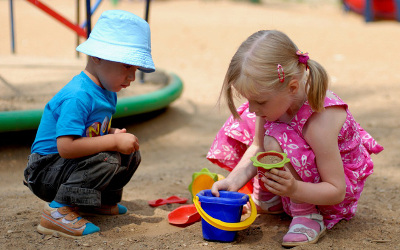AKIPRESS.COM -  In Kyrgyzstan, only one in five children aged 3-5 have access to preschool education. A new UNICEF initiative for community-based kindergartens is helping rural communities invest in their children’s futures.
In Kyrgyzstan, only one in five children aged 3-5 have access to preschool education. A new UNICEF initiative for community-based kindergartens is helping rural communities invest in their children’s futures.
Four-year-old Malika has been going to community kindergarten in the village of Yrdyk, Issyk-Kul region for the past several months. “I play there with girls and draw letters. I like it in kindergarten,” she says.
Malika and her family belong to the Dungan ethnic minority and live in a small village of Yrdyk in northern Kyrgyzstan, with a population of about 2,500 people. Issyk-Kul region is considered Kyrgyzstan's underdeveloped region, where residents, including Malika’s parents, are mainly engaged in agriculture. There is one school in the village for children aged 7 and above, but until recently, there had never been a preschool.
A lack of preschool education can have a huge impact on children like Malika. The experiences and external influences that children gain in preschool play critical roles in the formation and development of their brains. During the earliest years of life, a child’s brain has the potential to activate 1,000 brain cells every second. When children are protected, nurtured and stimulated, and have access to early education and play, they have the best possible chance of developing fully and learning effectively.
Preschools also contribute to improving school readiness, especially for children in rural areas like Issyk-Kul region.
In Kyrgyzstan, limited access to early education opportunities is a problem in many areas. The political, economic and social transformation that followed the country’s independence from the Soviet Union in 1991 left the state unable to finance or maintain preschools. As a result, 74 percent of preschool institutions were closed in the 1990s, and enrollment rates fell dramatically. Today, participation in formal early education in Kyrgyzstan for children aged 3-5 is still only at 22.7 percent countrywide.
UNICEF and the Ministry of Education and Science of Kyrgyzstan have been working to address the shortage of early learning and school readiness programs in the country.
In 2015, UNICEF and local authorities, with the support of the United Kingdom Embassy in Kyrgyzstan, opened 17 kindergartens, which provide preschool education to more than 1,000 children from cross-border and underprivileged communities in Kyrgyzstan.
In March 2016, two more community-based kindergartens ‘Danaker’ and ‘Seytek’ were opened in the villages of Layla and Maksat in the region of Batken, southern Kyrgyzstan. More than 130 children living in remote communities attend these kindergartens every day.
“The opening of every single kindergarten is so important for us. Expanding early education services and school readiness programs for young children is one of the priorities for the Ministry of Education and Science,” stated Toktobubu Ashimbayeva, Deputy Minister of Education and Science of Kyrgyzstan, at the opening ceremony in the village of Layla.
However, there are still not enough kindergartens for all young children in Kyrgyzstan to have a preschool education. Furthermore, traditional kindergartens are very expensive and lack places to accommodate children, especially in rural disadvantaged communities. To help narrow the coverage gap, a shift-based model for preschool institutions was introduced.
“Instead of a full day care, community-based kindergartens provide services for child development and education in shifts – one group attends in the morning and another one after lunch. This way one room in a building accommodates the same amount of children two times a day and no rooms for beds are necessary,” explains Chinargul Jumagulova, ECD Officer in UNICEF Kyrgyzstan.
Local communities and authorities open these kindergartens by finding the premises and allocating local resources for salaries. UNICEF helps to build toilets, train teachers and provide furniture, toys and teaching materials.
In recent years, more than one hundred community-based kindergartens have been opened throughout the country, which helped to increase the coverage of children with preschool education. The percentage of rural children with school readiness also increased to 40 percent in 2014, compared to just 8.8 percent in 2006.
“Research proves that during the first few years of a child’s life their brain grows at a rapid speed. It determines their capacity to learn, social, emotional, physical development, and their success in the future,” says Yukie Mokuo, UNICEF Representative in Kyrgyzstan. “UNICEF is committed to expand our work on early childhood development in Kyrgyzstan to reach even more boys and girls like Malika with learning opportunities, as every single child deserves a fair start in life.”
